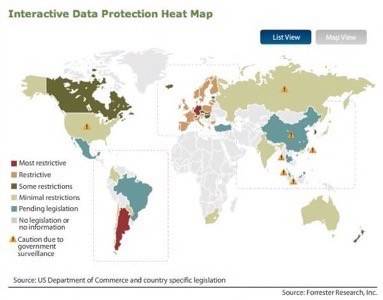Just because your data is housed “in the cloud” doesn’t mean that earthbound geography can simply be ignored. And while the World Wide Web promises a global and ubiquitous technology, location still matters.

Obviously, data is still housed in a particular place, even if that place is “in the cloud.” And while major cloud providers have data centers worldwide – often with locations across several sites in Asia, Europe, and North America – the specific location of these cloud centers as well as the location of the end-users remain important – and complicated.
Already location is often used to help address performance: where someone resides can be used to determine which data center is utilized. Location can also be a factor to restrict or enable access in order to comply with certain export laws, blocking access to applications for residents of certain countries, for example.
But in addition to questions of performance and of access, there can be substantial legal ramifications based on location as well. Different countries tend to have varying requirements and restrictions for the privacy and security of information stored there. Argentina and Germany have very restrictive privacy laws, for example, while Hong Kong and South Africa have minimal restrictions.

One of the promises of cloud technology is the ability to scale infinitely and on demand, but clearly location needs to be part of the equation – not just to ensure performance, but to ensure compliance with local laws.
The relationship between location and the cloud has been the subject of several Forresterreports. And CloudSleuth offers a service so you can do your homework about cloud providers, geography, and performance.

















